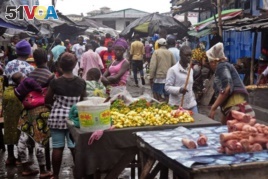02 March, 2018
About one in three people worldwide eats food that fills them up but lacks protein, vitamins and minerals.
Health experts have a name for this situation: "hidden hunger." It can lead to weakness in the body's natural defenses against disease. It can also limit a person's growth and affect intelligence.
Now, the founders of an American food manufacturer are putting technology and financial resources to work to address the problem. They are looking for ways to make low-cost, traditional meals more nutritious. And, at the same time, make sure that people will like the taste.
The company, called Just, is based in San Francisco, only a short drive from California's Silicon Valley.
Just is best known for making products such as plant-based mayonnaise, cookie dough and salad dressings. These foods can be found at supermarkets in the United States.
The company is now working in Liberia, where 30 percent of the population suffers from poor nutrition.
Just is partnering with local manufacturers and suppliers to make a product called Power Gari. It is based on the cassava plant, a common ingredient in Liberian cooking. The mixture for Power Gari turns the starchy cassava into a nutritious, soft food filled with vitamins and minerals. It has 12 grams of protein and, thanks to locally-produced red palm oil and salt, a taste many people find appealing.

FILE - People buy food at a local market in Monrovia, Liberia.
In January, Power Gari began appearing at stores in Monrovia, Liberia's capital. The product has six ingredients. Just says more than 80 percent of them are from local suppliers. The company gave a Liberian manufacturer permission to make Power Gari. The manufacturer works with local suppliers to meet food safety rules.
"Our goal here is to build a better food system in Liberia and that means we are hands-on," says Taylor Quinn, director of emerging markets for Just. He lives in Monrovia.
Over the past two years, Quinn has carried ingredients from Liberia to San Francisco for the company's scientists and others to study. It is sometimes difficult to get the local taste right, Quinn noted. He added, "The cassava – or the sugar, or whatever it may be that we're using in northern Liberia – is different than what we can get access to here in the office."
The company is continually changing the manufacturing directions for the product, Quinn added.
A 50-gram serving of Power Gari costs about five cents for the wholesale product served in schools. In stores, it sells for about 15 cents per serving.
One of the most difficult problems for Quinn is to find out what works best in Liberia. When it came to the machinery used at the factory of Just's manufacturing partner, he wanted a mixing machine made in Liberia that can work without electricity. He found a local manufacturer who made the machines for about $800 and can do repairs, if needed.
When the power first went out during production, the workers started producing the mixture with a hand crank. "After a few minutes of hand cranking, it was perfect," Quinn said.
The true proof of Power Gari's success will be if Liberians buy it. The company says it looked to Liberia as a test case before thinking about expanding to bigger markets, such as Nigeria or Kenya.
The goal, says company founder Josh Tetrick, is nothing less than solving the world's unjust food system.
"Why are we not approaching this with the kind of ferocity that high growth companies bring to their own operations?" he asked.
Just has raised more than $200 million from investors and is valued at over $1 billion. The company has made changes in its leadership recently to add directors with international business, agriculture and sustainability experience.
I'm Dorothy Gundy and I'm Susan Shand
Michelle Quinn reported this story for VOANews. George Grow adapted her report for VOA Learning English. Kelly Jean Kelly was the editor.
________________________________________________________________
Words in This Story
resource – n. a supply of something that can be used when it is needed
ingredient – n. one of the substances used to make a mixture
emerging – adj. newly created; developing
access – n. permission or ability to enter something
starchy – adj. containing starch; serious in behavior
crank – n. a machine part that can be turned in a circle to move something
approach – v. to move or become nearer to something
ferocity – n. the quality of being very fierce
We want to hear from you. Write to us in the Comments Section.